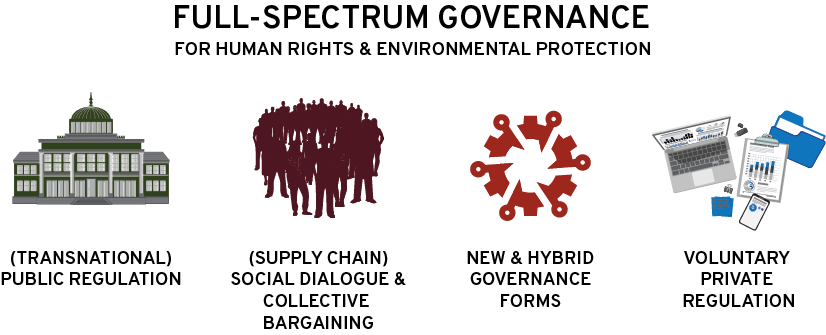KATALYST INITIATIVE'S MISSION
Katalyst Initiative was founded by civil society veterans to help create the governance tools needed to protect human rights and the environment in complex 21st century value chains. We often use the garment industry as a test case for developing solutions applicable across a wide range of industries that will need to transform in the very near future.
A pressing need for improved governance
A ‘Just Transition‘ to economies that respect the rights of workers and operate within planetary boundaries will require behavioural change across the various stages of global value chains. For this reason, Katalyst’s work focuses on questions of governance: the power to define and compel behavioural norms among companies that make up value chains. We see a critical need to rapidly catalyse* a new, shared strategic vision for governing global industries. For the last 20 years, value chain governance as been dominated by voluntary, business-led ‘regulation’, based on factory audits and codes of conduct. As our colleagues at Cornell University and elsewhere have documented, these efforts had very limited success in protecting workers or the environment.

If we want to create industries that respect the rights of workers and protects the environment, we will need a different set of rules and new ways to enforce them. Katalyst advocates for replacing over-reliance on voluntary efforts with what we call full-spectrum governance. This is a ‘smart mix’ of governance forms designed for the future, with transnational public regulation and collective bargaining fit for global supply chains as central pillars. It also has space for new and hybrid governance forms such as investor-led sustainability initiatives. Katalyst’s goal is to help policymakers and civil society actors to design these new forms of governance to finally end the longstanding abuses and corrosive inequality in global supply chains; to reduce the environmental harms done by many industries; to help workers and communities adapt to the climate impacts they are facing; and to give new, sustainable business models a chance to succeed in environments dominated by those who benefit from the status quo.
* As our chemistry teachers taught us long ago, a catalyst provides inputs that can help other agents do what they already do, but more quickly, with less energy and waste, and usually with strong bonds to each other.

